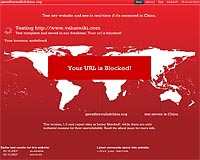| . |  |
. |
Beijing (AFP) Feb 4, 2010 China hit back at the United States on Thursday after President Barack Obama vowed to get tougher with the Asian giant on trade and currency, stoking tensions already high over Taiwan and Tibet. Obama on Wednesday hinted he would take Beijing to task over the strength of its yuan currency, responding to growing discontent in the US Congress over Chinese monetary policy as the US economy makes an uncertain recovery. "Wrongful accusations and pressure will not help solve the issue," foreign ministry spokesman Ma Zhaoxu told reporters when asked about Obama's comments. He also called for both countries to make efforts to develop their relations. "We should respect each other's core interests and major concerns, so as to ensure the steady development of our relations." In a meeting with senators from his Democratic Party Wednesday, Obama said he supported trade agreements with China but urged the developing power to open its markets further to US goods. "The approach that we are taking is to try to get much tougher about enforcement of existing rules," Obama said. He said what was needed was "putting constant pressure on China and other countries to open up their markets in reciprocal ways. "One of the challenges we have got to address internationally is currency rates, and how they match up to make sure that our goods are not artificially inflated in price and their goods are artificially deflated in price." Many policymakers in developed economies accuse China of keeping its yuan artificially low for the sake of its manufacturing industry, funding a flow of cheap exports around the world. But China argues that its peg to the dollar offers stability in a rapidly changing economy and has warned in turn against US protectionism. "The RMB exchange rate has never been the major cause for the trade deficit of the US," Ma said. Beijing also says it has contributed to a global economic recovery with its 585-billion-dollar stimulus package to fight the financial crisis. The Chinese comments could increase existing tensions over a 6.4 billion-dollar arms deal between the United States and Taiwan, and Obama's upcoming meeting with Tibet's exiled spiritual leader the Dalai Lama. China, which considers Taiwan part of its territory, on Saturday snapped off military ties with the United States and threatened to blacklist US companies involved in the arms sales to the self-ruled island. The United States does not diplomatically recognise Taiwan, where China's defeated nationalists fled in 1949, but has made a commitment in law to provide the island with arms for defensive purposes. China said this week it was "resolutely opposed" to a meeting between Obama and the Dalai Lama, who will visit Washington from February 17. The Dalai Lama, who won the Nobel Peace Prize in 1989, is widely respected in the United States for his spiritual teachings. China accuses him of separatism, although he says he accepts Chinese rule of Tibet and is only seeking greater autonomy for his Himalayan homeland. The United States and China are also at odds over Internet censorship, after Google last month threatened to pull out of the communist nation following attacks on human rights activists' email accounts.
Share This Article With Planet Earth
Related Links Global Trade News
 China welcomes foreign Internet firms: minister
China welcomes foreign Internet firms: ministerParis (AFP) Feb 3, 2010 Access to the Internet in China is "completely open" and foreign firms are welcome to work in the thriving sector, China's Foreign Minister Yang Jiechi said on Wednesday. Beijing is locked in a dispute with US Internet giant Google which has threatened to pull out of the Chinese market over cyberattacks and Web censorship in China. "We are always very happy to welcome foreign firms (in C ... read more |
|
| The content herein, unless otherwise known to be public domain, are Copyright 1995-2010 - SpaceDaily. AFP and UPI Wire Stories are copyright Agence France-Presse and United Press International. ESA Portal Reports are copyright European Space Agency. All NASA sourced material is public domain. Additional copyrights may apply in whole or part to other bona fide parties. Advertising does not imply endorsement,agreement or approval of any opinions, statements or information provided by SpaceDaily on any Web page published or hosted by SpaceDaily. Privacy Statement |